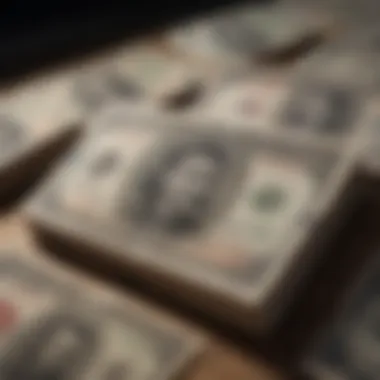Investing in Iraqi Dinar: Opportunities and Risks


Intro
Investing in foreign currencies brings to mind thoughts of opportunity but also risks. Among these currencies, the Iraqi Dinar stands out, not just for its unique history and current dynamics but also for its potential as an investment. The tumultuous backdrop of Iraq's socio-political landscape creates a narrative that is as captivating as it is complex.
In this article, we will explore what makes the Iraqi Dinar interesting to investors. We will navigate historical contexts, current market trends, and future opportunities, giving you the tools to evaluate whether adding this currency to your portfolio is a prudent move.
Investment Products Overview
Definition of Investment Products
Investment products can be defined as financial instruments that an investor uses to earn a return on capital. These products can take various forms, ranging from stocks and bonds to currencies and commodities. When diving into the realm of investing, it's crucial to understand what type of product aligns with your financial goals.
Types of Investment Products
The landscape of investment products is diverse. Below are some categories relevant to those interested in currency investments:
- Foreign Currency Options: These give an investor the right, but not the obligation, to buy or sell a currency at a predetermined price before a specified date.
- Currency ETFs: Exchange-traded funds can track the performance of the Iraqi Dinar, providing exposure without holding the physical currency itself.
- Forex Trading: This involves buying and selling currency pairs on the foreign exchange market. Trading the Iraqi Dinar against a more stable currency like the US Dollar can be enticing.
"Investors should always do their homework before diving into any currency market. - Unknown"
Comprehensive Investment Dictionary
Key Terms Explained
To navigate investment discussions effectively, it's beneficial to familiarize oneself with common terminology:
- Appreciation: An increase in the value of a currency.
- Depreciation: A decrease in the value of a currency.
- Speculation: The practice of buying and selling in the hopes of making a profit based on future price changes.
Glossary of Financial Terms
Understanding the lingo is key for making informed decisions. Common terms include:
- Liquidity: The ease with which an asset can be converted into cash without affecting its price.
- Volatility: The statistical measure of the dispersion of returns for a given security or market index.
Investing in currency isn’t for everyone, especially with a currency such as the Iraqi Dinar, which can be subject to high fluctuations. Knowing these concepts can greatly enhance your decision-making skills as you venture into this financial territory.
Foreword to Iraqi Dinar Investment
The Iraqi Dinar investment opportunity is one that draws quite a bit of attention these days, especially among those looking for less conventional ways to diversify their portfolios. With everything unfolding in the geopolitics of the region and the ongoing economic shifts, the potential for profit can be alluring yet precarious. More than just a currency, the Iraqi Dinar symbolizes a chance to engage with both emerging markets and the broader fluctuations of the global economy.
Investing in any currency isn’t just about keeping cash under the mattress; it’s a dynamic environment fraught with ups and downs. When it comes to the Dinar, factors like its historical context, current economic indicators, and future potential demand come front and center. Understandably, a keen investor would want to navigate these waters intelligently, keeping themselves informed on what’s at stake.
Consider the many angles of this investment—from the implications of geopolitical stability to the various signals sent out by central banks. It’s vital to have a holistic view, as each piece of information plays a role in the larger puzzle of currency investment.
Defining Currency Investment
When we talk about currency investment, we’re not just referencing buying a foreign bill to stow away for a rainy day. Currency investment refers to the process of buying and holding currency with the expectation that its value will increase over time relative to other currencies.
That said, the beauty of currency trading lies in its fluidity. Investors engage in buying and selling currencies on forex markets, often utilizing leverage to increase the potency of their trades. In simpler terms, they gamble on the movements of currency values based on various financial and political factors.
So why would anyone locate their interest in something like the Iraqi Dinar specifically? One reason could be the potential for dramatic appreciation against more stable currencies, should socio-economic conditions in Iraq improve. After all, in the world of currency trading, timing is everything—much like the old adage about waiting for the right moment to strike.
The allure of high returns strategies can be enticing; however, it comes with its fair share of risks. Currency values are inherently volatile and can change with the blink of an eye. Many investors might also look towards historical shifts when evaluating potential growth or instability, particularly in a nation like Iraq that’s been caught in cycles of turmoil and recovery.
"Investing in currencies requires both a keen understanding of economic fundamentals and intuition about geopolitical landscapes. It’s not just about riding waves, but comprehending the currents below the surface."
Deciding to invest in the Iraqi Dinar is, therefore, not only an investment in a currency; it’s an investment in the narrative of Iraq itself and its journey toward economic stabilization.
Undoubtedly, this venture has its glass half-full and half-empty scenarios, depending on how you choose to interpret the underlying dynamics at play.
Historical Context of the Iraqi Dinar
Understanding the historical context of the Iraqi Dinar is crucial for any potential investor looking into this unique currency. The journey of the Dinar is not just about numbers and exchanges; it's a reflection of Iraq's tumultuous past, shaping its present and future. The currency has undergone significant transformations influenced by political instability, economic reforms, and market fluctuations. By examining its historical background, investors can gain deeper insights into its current market viability and future prospects. This understanding can help one to navigate the intricate landscape of foreign currency investment.
Pre-2003 Economic Status
Before 2003, the Iraqi economy was heavily centralized with a focus on state-owned enterprises. The Dinar itself, which was once considered a stable currency, faced severe devaluation during the 1990s due to international sanctions imposed after the Gulf War. This led to hyperinflation, making the Dinar nearly worthless in the global market. For example, in 1991, one US Dollar was worth roughly 3 Dinars, but by 2003, that figure had skyrocketed to an astounding 3,000 Dinars per Dollar.
Many Iraqis were left feeling the pinch, as their savings evaporated overnight, causing widespread economic distress. There was an increased reliance on bartering, and people lost faith in the banking system. When discussing the pre-2003 economic status, it’s essential to recognize that it wasn’t merely the Dinar’s value that suffered, but the broader confidence in Iraq’s financial stability that took a major hit.
Post-2003 Market Reconstruction
In the wake of 2003, following the removal of Saddam Hussein, the Iraqi economy underwent significant reconstruction efforts, aimed at stabilizing and revitalizing various sectors. The initial post-war period introduced a new version of the Dinar, with a new banknote series released to combat inflation and restore public confidence. By ditching the old notes, which had become symbols of a broken economy, the new Dinar aimed to set a fresh course for Iraq’s financial future.
Several initiatives, coupled with international investments and technical assistance, worked to rebuild critical infrastructures, including oil, which is a dominant force in Iraq’s economy. As the economy started to open up, the Dinar gained a gradual footing, albeit with ongoing challenges.
Although the Dinar showed signs of recovery, it is vital to note that the journey hasn't been smooth. Issues like political tensions, security risks, and dependency on oil prices still pose threats. On the other hand, improvements in governance and economic policies represent beacons of hope. Investors are now keenly observing the reconstruction efforts as these factors could play a substantial role in the Dinar's attractiveness as an investment option.
"Understanding the context of the Iraqi Dinar is akin to reading a gripping novel — every chapter unfolds layers of complexity and opportunity."
In summary, the historical context of the Iraqi Dinar is complex and layered. The pre-2003 economic status paints a picture of a legacy burdened by sanctions and hyperinflation, while the post-2003 period reveals a nation striving for economic rebirth. Recognizing these elements is key for prospective investors aiming to make informed decisions regarding the Iraqi Dinar.
Current State of the Iraqi Economy
Understanding the current state of the Iraqi economy is crucial for any investor considering purchasing the Iraqi Dinar. The economic landscape not only informs potential returns on investment but also shapes the risks involved. Iraq, with its rich oil reserves and significant historical context, presents both opportunities and challenges. Investors need to grasp how these elements interplay in determining the health and stability of the currency.
GDP and Economic Indicators
When evaluating a country's investment potential, Gross Domestic Product (GDP) is one of the key metrics. As of the latest reports, Iraq’s GDP has shown fluctuations corresponding to global oil prices and political events. A positive GDP growth rate indicates an expanding economy, which might suggest a favorable environment for currency strengthening. Moreover, other economic indicators such as unemployment rates and household consumption also play significant roles.


In recent years, Iraq has experienced a volatile economic phase due to changing oil prices impacted by geopolitical events. Here’s a snapshot of the current indicators to assess:
- Oil Dependency: A heavy reliance on oil revenues impacts economic stability.
- Inflation Trends: Variations in inflation influence purchasing power.
- Foreign Direct Investment (FDI): Understanding investor confidence in the Iraqi economy.
Overall, while optimistic trends may emerge in GDP growth, the underlying mechanical issues must be carefully considered before diving into investments.
Political Stability and Economic Growth
The relationship between political stability and economic growth cannot be overlooked in Iraq’s context. Political unrest, factional disputes, and security issues often dictate economic progress. Investors should closely observe government reforms aimed at stabilizing the economy.
A stable political climate typically fosters an environment conducive for growth, leading to increased foreign investment and economic activities. Here are some key considerations:
- Government Policies: Policies that encourage business reforms can attract international investors.
- Regional Relationships: Iraq's ties with neighboring countries can also either facilitate or hinder economic interactions.
- Public Sentiment: Understanding the populace's view on governance can provide insights into potential future stability.
In the last few years, concerted efforts to promote legislation related to investment frameworks have been made, signaling potential growth opportunities for astute investors.
Inflation Rates and Currency Value
Inflation rates are integral in evaluating the currency's value and investment feasibility. In Iraq, inflation has been on a rollercoaster ride, which directly affects the purchasing power of the Dinar. High inflation typically erodes confidence in a currency, leading to decreased value over time. The connection between inflation and currency value is a vital one:
- Current Inflation Rates: Recent numbers can indicate whether the economy is heating up or cooling down.
- Impact on Consumers: Rising costs can cause consumers to tighten their belts, impacting overall economic activity.
- Central Bank Policies: Monetary policies aimed at curbing inflation can stabilize the Dinar’s value and potentially create a more predictable environment for investors.
Monitoring inflation not only helps investors understand current conditions but also offers insight into the future trajectory of the Iraqi Dinar.
"Economic principles may offer guidance, but they often play second fiddle to the volatile political landscape in Iraq."
In summary, the current state of the Iraqi economy is a multifaceted puzzle that requires careful thought and analysis from any investor. Taking the time to understand these elements can significantly impact the decision-making process when contemplating investments in the Iraqi Dinar.
Analyzing the Investment Potential
Assessing the investment potential of the Iraqi Dinar is crucial for anyone considering entering this unique market. Investing in currency, particularly one from a nation with such a tumultuous history, requires more than just a cursory glance. Understanding the dynamics of market demand and supply can shed light on the future prospects of the Dinar and may help investors make informed decisions.
There are several factors that contribute to the potential value of the Iraqi Dinar. For starters, the oil-rich economy of Iraq plays a significant role in shaping its currency's value. Despite economic challenges, the country's natural resources present opportunities that can lead to a rebound in currency value. Without recognizing these elements, investments can feel like trying to catch smoke with bare hands.
Market Demand and Supply Dynamics
Market demand and supply dynamics sit at the heart of currency investment. Simply put, the value of any currency is largely dictated by the interplay between how much of it is in circulation and how much people want it.
- Supply of Iraqi Dinar: The Central Bank of Iraq manages the supply of Dinar to control inflation and stabilize the currency. Over the years, fluctuations in the amount of currency available can impact its overall value.
- Demand Factors: Demand for the Dinar can be influenced by several external factors such as geopolitical stability, the performance of Iraq’s economy, and perceptions about the country's future. For instance, if political stability rises, demand for Dinar might see an upward tick as investors look for opportunities in the market.
- Investment Trends: Insights on where the bulk of investments are flowing can help gauge overall demand. For instance, if significant foreign investments are flowing into the region, the demand for the local currency, in this case, the Dinar, could see a corresponding rise.
To provide context, here's how supply and demand can create a narrative:
- Increased Oil Prices: If global oil prices increase, Iraq could see an influx of revenue, which might bolster the Dinar’s value as more foreign currency exchange occurs.
- Political Stability: When elections conclude peacefully or diplomatic ties improve, investor confidence can lead to increased demand, pushing up the currency's value.
- Global Economic Conditions: Economic downturns in other markets might push investors toward perceived 'safer' options, creating either more demand or diminishing it depending on their views of Iraq's potential.
"The exchange rate of a currency reflects the market’s perception of its future economic conditions. Knowing how to interpret those signals can be the difference between a wise investment and a costly mistake."
In summary, understanding the dynamics of supply and demand can arm investors with strategies to navigate the murky waters of currency investment. It's about weaving together market realities and forecasts, making sense of sometimes conflicting signals to find a potentially profitable position in an ever-changing landscape.
Risks Associated with Investing in Iraqi Dinar
Investing in the Iraqi Dinar can be a tantalizing prospect for many, particularly given its potential for appreciation and the current economic climate. However, understanding the risks associated with this investment is crucial for anyone contemplating whether to dive in. An awareness of the potential pitfalls can mean the difference between a lucrative venture and a costly mistake. Factors such as market volatility, geopolitical risks, and regulatory challenges weave a complex tapestry that any prospective investor must navigate with caution.
Market Volatility
Market volatility is an inherent risk in any currency investment, but it can be particularly pronounced in the case of the Iraqi Dinar. The currency has seen considerable fluctuations, often influenced by broader economic changes and political developments within the region. For instance, shifts in oil prices— a major driver of the Iraqi economy— can directly impact the Dinar’s value. Additionally, high levels of speculation often cause rapid changes in currency prices.
Investors should be mindful of:
- Rapid Price Changes: Currencies can swing dramatically based on news, legislation, or major economic events.
- Low Liquidity: Relatively lower trading volumes can make it difficult for investors to enter or exit positions without affecting the market price.
- Speculative Trading: The Dinar's value may be driven as much by speculation as by economic fundamentals, leading to erratic pricing.
Given these factors, it’s wise to maintain a healthy dose of skepticism and conduct thorough research before making commitments.
Geopolitical Risks
Iraq's geopolitical landscape is layered and often fraught with tension. The political situation can directly affect the value of the Dinar, meaning that investors are not only putting their money into the currency itself but also into the region's stability. Ongoing conflicts, changes in leadership, and relations with neighboring countries can create uncertainties that shake investor confidence.
Key elements to keep in mind include:
- Regional Conflicts: Ongoing tensions in the Middle East can impact not only Iraq but the entire region, affecting currency values.
- Government Stability: Changes in government and various political factions vying for power can lead to uncertainty.
- International Relations: Sanctions or diplomatic issues can have immediate effects on trade and currency market perception.
Understanding the geopolitical risks involved is crucial to making informed decisions about the potential upsides of investing in the Iraqi Dinar.
Regulatory Challenges
The regulatory environment surrounding the Iraqi Dinar presents its own set of challenges. Currency investments may be subjected to stricter regulations than one might expect, which can impact investment strategies. Factors like banking policies, anti-money laundering regulations, and currency restrictions could come into play and pose hinderances.
Investors should consider:
- Currency Restrictions: The Iraqi government may impose limitations on the buying, selling, or holding of the Dinar.
- Evolving Regulations: Changes in law can happen quickly, and what might be advantageous now could shift overnight.
- Limited Access to Information: Transparency in financial regulations can often be low, making it difficult for investors to understand their rights and obligations.
Staying informed about regulatory changes and potential restrictions is vital for navigating the complexities of investing in the Iraqi Dinar.
"In the world of currency investment, being informed isn’t merely a benefit; it’s a necessity."
Expert Opinions on Iraqi Dinar Investments
When it comes to investing, the counsel of seasoned experts can provide invaluable insights. In the case of the Iraqi Dinar, expert opinions can illuminate the intricate nature of the currency and its market, helping potential investors discern whether it's a wise choice for their portfolios. This segment is crucial because it compiles viewpoints from various financial analysts who dissect economic trends, geopolitical influences, and investment strategies tied to the Dinar.
Economists often have a pulse on market trends and can forecast shifts that might affect the value of currencies. They evaluate a combination of current economic data, historical contexts, and future speculations. For anyone considering an investment in the Iraqi Dinar, tapping into these expert predictions can serve as a guiding beacon amidst the uncertainty that often shrouds emerging markets.


Moreover, expert opinions can emphasize the benefits and risks associated with investing in such a volatile currency. Understanding where the Dinar stands in the global currency landscape can help investors align their strategies with broader economic movements. For instance, the interplay of supply and demand dynamics, the influence of oil prices, and Iraq’s political landscape could significantly sway the currency's value.
In short, expert insights are not just beneficial; they are essential for molding a well-informed investment strategy, especially when the terrain is as complex as the one surrounding the Iraqi Dinar.
Predictions from Economists
Economists have diverse views on the investment potential of the Iraqi Dinar. Their predictions, grounded in research and analysis, often explore several key aspects vital for prospective investors:
- Market Recovery Potential: Economists track Iraq's post-conflict recovery and ongoing reconstruction efforts. Many argue that as infrastructure improves, so too can economic stability, pushing the Dinar towards appreciation.
- Geopolitical Influences: Political stability remains a Watchword. Economists frequently caution that volatility might emerge from internal conflicts or regional tensions, which can impact investor confidence. Their predictions often hinge on the likelihood of sustained government efforts to stabilize and develop the economy.
- Oil Prices: Given Iraq's dependence on oil exports, economists highlight the importance of global oil prices in forecasting the Dinar's value. A resurgence in oil prices could bolster Iraq’s economy and strengthen the currency. Conversely, dips could pose risks.
- Inflation Trends: Monitoring inflation rates is another predictive tool. Unlike static currencies, the Dinar has shown susceptibility to inflationary pressures. Economists often emphasize the need for prospective investors to carefully evaluate these trends to fully understand Dinar’s purchase power.
Experts might say:
"The path of the Iraqi Dinar is intricate, moving in tandem with a mosaic of external and internal factors. Awareness of these can shorten the odds for investors.”
By weaving together these insights, economists strive to create a clear picture of what investing in the Iraqi Dinar might entail. For anyone keen on navigating this investment landscape, their predictions provide a crucial lens to focus on potential gains and inherent risks, equipping investors with knowledge that could make a real difference in decision-making.
Alternative Currency Investments
In the landscape of global finance, the notion of investing in currencies beyond your local fiat holds a significant position. Alternative currency investments provide a unique way to diversify portfolios, hedge against inflation, and potentially capitalize on favorable economic shifts. Specifically, when discussing the Iraqi Dinar, examining alternative currency investments unveils layers of strategic opportunities as well as inherent risks.
Exploring different currencies can break the monotony of stocks and bonds. It complements existing financial strategies by tapping into different economic indicators and trends. Investors looking at the Iraqi Dinar should consider how it compares against other currencies in the Middle East and the broader global arena.
Comparing with Other Middle Eastern Currencies
The Middle East is home to a variety of currencies, each subject to its own unique economic and political landscapes. When evaluating the Iraqi Dinar, it’s essential to hold it against currencies such as the Kuwaiti Dinar, the Saudi Riyal, and the UAE Dirham. Each of these currencies exhibits different dynamics that could influence investor sentiment.
For instance, the Kuwaiti Dinar, being one of the highest-valued currencies worldwide, sets a benchmark in stability and economic health within the region. Conversely, the Iraqi Dinar often reflects the country's ongoing socioeconomic challenges and political instability, which can trigger swift fluctuations in value. Additionally, the Saudi Riyal's association with oil exports creates a somewhat predictable value based on global oil demand—something that might not be the case for the Iraqi Dinar, which is often believed to be under pressure from various local and external factors.
"In the world of currency trading, knowledge is as crucial as the money you invest. Knowing your competitors can mean the difference between profit and loss."
- Investors considering the Iraqi Dinar might benefit from understanding the current trends surrounding these neighboring currencies. Not only does this provide insights into the immediate economic Rivalry but also sheds light on potential future shifts that could support or hinder the Dinar.
Global Currency Trends Influencing Dinar
As we circle back to a global perspective, it’s evident that various factors influence the currency market as a whole. The Iraqi Dinar does not exist in a vacuum; it is affected by macroeconomic variables like interest rates, inflation rates, and geopolitical tensions.
For instance, global oil prices can have a knock-on effect on the Dinar's value. Given Iraq's heavy reliance on oil exports, any fluctuation in oil prices might influence investor confidence and demand. Furthermore, the actions of major currency players—like the United States Dollar or the Euro—create ripples in the market.
Notably, technological advancements in trading platforms allow investors to react promptly to news or trends. Immediate access to information can sway buying and selling decisions faster than ever. As a result, being aware of global events and the stance of major economies becomes critical for anyone eyeing investments in the Iraqi Dinar.
In summary, alternative currency investments play a pivotal role in expanding one’s financial horizons. By recognizing how the Iraqi Dinar interacts with other Middle Eastern currencies and remains subject to broader global influences, investors position themselves to make informed and potentially lucrative decisions.
Long-term Versus Short-term Investment Strategies
The debate between long-term and short-term investment strategies holds significant weight when considering the Iraqi Dinar as an investment avenue. Investors must weigh the risks and benefits carefully before taking the plunge into a market that remains unpredictable due to various economic and geopolitical factors. Both strategies come with their own set of intricacies, calling for a nuanced understanding of each.
Ideal Investment Horizons
When it comes to choosing between long-term and short-term horizons, understanding the context of the Iraqi economy is crucial. Ideally, short-term investors might look for quick gains, which can be tantalizing given the speculations that circulate around the Dinar's value. However, the Iraqi Dinar has a history that suggests its value may take time to stabilize and appreciate.
Investors aiming for short-term gains might target specific economic events, such as government decisions or changes in oil prices, which can create volatility in the foreign exchange market. However, just like a double-edged sword, this approach may yield profits but also exposes the investor to risks of sudden downturns.
On the flip side, a long-term investment strategy may align with those looking for a more stable and gradual increase in value. Holding Dinar over several years could potentially harness significant appreciation as the country continues to rebuild its economy. Investors would need patience for this approach, as the timeline can stretch well beyond immediate market shifts.
Strategies for Risk Mitigation
Navigating the complexities of currency investments calls for comprehensive risk mitigation strategies that cater specifically to the volatility of the Iraqi Dinar. In pursuing both long-term and short-term investment paths, the following strategies are worth considering:
- Diversification: Rather than placing all bets on the Dinar, investors should consider a diversified portfolio that includes other currencies or assets. This reduces the risk if one investment doesn’t fare as expected.
- Regular Monitoring: Keeping a close eye on economic indicators and political events in Iraq can provide clues on currency stability. By setting alerts or using market tracking tools, investors can be more responsive to shifts that could impact their positions.
- Setting Stop-Loss Orders: For those willing to engage in short-term trading, a stop-loss order can be a lifeline. By determining a predetermined loss limit, investors can automate their exit from a position if the market goes against them.
- Educated Speculation: Understanding the speculatory nature of currency trading can be invaluable. Engaging with forums like reddit.com or resources like en.wikipedia.org can provide insights from other investors navigating similar waters.
In summary, whether leaning towards a long-term or short-term strategy, each investor’s journey with the Iraqi Dinar will vary. Thus, aligning one’s approach with individual financial goals and risk tolerance is essential for navigating this uncharted territory effectively.
The Role of Speculation in Currency Markets
Speculation is a crucial player in the world of currency markets, influencing exchange rates and affecting investment decisions. In the context of the Iraqi Dinar, understanding speculative behavior helps investors gauge potential opportunities and risks. Many investors tend to dip their toes into the waters of speculation, hoping to catch a wave of profitable returns. But it’s important to realize that speculation isn't just about making a quick buck; it involves a complex interaction of psychology, market dynamics, and external factors.
Understanding Speculative Behavior
Speculative behavior manifests itself in various ways within currency trading. Investors often act on beliefs rather than solid fundamentals, buying and selling based on anticipated future price movements. The allure of rapid profits can lead traders to invest heavily in currencies like the Iraqi Dinar, especially when they believe that market conditions might favor a price surge.
Factors influencing speculative decisions include:
- Market Sentiment: The mood of the market can significantly sway investor behavior. When news emerges about Iraq's economic progress, traders might rush to purchase Dinar, speculating on its future value.
- Trend Analysis: Many market players lean on technical analysis, examining charts and price patterns. If trends look favorable, it can encourage more investors to jump in, creating a self-fulfilling prophecy of speculation.
- Geopolitical Events: Political stability, elections, or conflicts can trigger speculative waves. Since the Iraqi Dinar is tied closely to Iraq's political landscape, any news can send ripples through the market, igniting speculation.
Speculators can drive up the price of the Dinar, but such movements are often short-lived. Thus, understanding the nature of this behavior and its pitfalls is vital for any investor considering venturing into Dinar investments.
Impact of Online Marketplaces
Online marketplaces have revolutionized the way investors engage with currencies, including the Iraqi Dinar. The rise of platforms like eBay, Reddit discussions, and various specialized exchange sites have made it easier for individuals to trade and invest in currencies with unprecedented accessibility.
Here are some potential impacts:
- Increased Accessibility: The proliferation of online trading has brought the Dinar to the fingertips of many novice investors. Now, it’s no longer just institutional investors who are in the game. Anyone with internet access can throw their hat into the ring.
- Pooling of Information: Marketplaces often serve as hubs for information exchange. Investors share tips, forecasts, and opinions, leading to an influx of speculation based on community sentiment rather than solely on economic fundamentals. This can sometimes create unrealistic expectations.
- Price Volatility: The ease of buying and selling can lead to swift price changes. If a wave of buying occurs due to speculative behavior ignited by social media or forums, the Dinar’s value may drastically fluctuate in a short time.
"The power of online trading platforms cannot be underestimated; they magnify both the opportunities and risks associated with currency investing."
Assessing Personal Investment Goals


Investing in the Iraqi Dinar—or any currency, for that matter—is not just a whimsical act of buying and holding some paper money. It’s an investment decision that requires a solid understanding of one’s own financial aspirations. Assessing personal investment goals lays the foundation for a meaningful engagement with currency investment. Without a clear direction, the journey can easily veer off course, leading to unfulfilled expectations and, perhaps, financial loss.
Aligning Currency Investment with Financial Objectives
When you think about currency investment, particularly in something as dynamic as the Iraqi Dinar, it’s essential to evaluate where you stand financially and where you hope to go. Your objectives can range widely: perhaps you’re looking to diversify your portfolio, protect against inflation, or even speculate for potential gains. Whatever the case, knowing your specific objectives makes all the difference.
- Define Clear Goals: Begin by laying out what you want to accomplish with this investment. Is your aim short term, driven by quick returns, or do you seek longer-term stability? Defining your goals in this way helps you navigate the often-turbulent waters of currency investments.
- Understand Your Risk Tolerance: Not everyone has the same stomach for risk. For some, investing a small amount in the Iraqi Dinar might feel like a benign game to pass some time. Others—especially those directly affected by the uncertainties of the market—might find it an unsettling endeavor. Honest reflection on your comfort with risk is crucial.
- Consider Financial Stability: How does investing in the Iraqi Dinar fit within your overall financial picture? Having a good grasp of your income, expenses, and other financial commitments will guide you in making informed investment decisions.
- Set Timeframes for Evaluation: Just as you assess the performance of stocks or bonds, determining a timeline for reviewing your Dinar investment can be beneficial. Setting benchmarks to evaluate the success of your investment gives you a structured way to gauge your progress and make necessary adjustments.
As you ponder these elements, remember that your personal investment goals should be as fluid as the markets themselves.
"An informed investor is a successful investor. Taking the time to reflect on one's own financial ambitions is an investment in itself."
As you craft your approach to the Iraqi Dinar, considering the nuances of your objectives can bridge the gap between mere speculation and a calculated financial strategy. Ultimately, aligning your currency investment with your financial objectives isn’t just smart—it’s essential for navigating the unpredictable landscape of currency markets.
Practical Steps for Investing in Iraqi Dinar
When considering an investment in the Iraqi Dinar, a robust approach is vital. Unlike popular currencies, the Dinar’s market isn’t mainstream, thus understanding the nuances within this realm is essential. By establishing a clear method for your investment, you can mitigate risks and maximize potential gains. These practical steps can serve as a roadmap to navigate the complexities involved in this unique form of currency investment.
Finding Reliable Sources
In a world full of misinformation, finding reliable sources is like searching for a needle in a haystack. You want to deal with trusted entities when diving into Iraqi Dinar investments. Start by looking for financial institutions or currency exchange firms with a solid reputation. Websites like en.wikipedia.org or britannica.com can provide foundational knowledge about the currency itself.
Furthermore, engaging in forums or communities on platforms such as reddit.com might reveal insights that aren’t part of the mainstream discourse. You can find discussions from actual investors sharing their experiences, which can prove invaluable. Remember to scrutinize each source carefully; you wouldn't want to base financial decisions on hearsay or second-hand information.
Key things to consider include:
- Licenses and certifications: Ensure the source is officially recognized.
- Customer reviews and testimonials: They can provide a fuller picture of reliability.
- Transparency: The clearer a source is about fees, risks, and processes, the more likely it is trustworthy.
Understanding Currency Conversion Processes
Currency conversion isn’t just a technical necessity; it's a critical aspect of investing in the Iraqi Dinar. Knowing how to convert currencies accurately helps you gauge how much your investment is truly worth. Making sense of the conversion process involves grasping some basic concepts. You need to familiarize yourself with terms like 'exchange rates,' 'buy/sell rates,' and 'market fluctuations.'
To simplify this, here are a few pointers:
- Follow current exchange rates: They fluctuate based on market conditions. Keeping an eye on these rates helps you choose the right time to make your move.
- Conversion fees: Be conscious of fees applied during conversion. Sometimes, a seemingly fantastic rate can vanish under layers of hidden charges.
- Timing: Currency values can swing based on international events. Keep yourself informed about geopolitical situations which can affect the Dinar’s value.
Learning these processes may seem tedious, but understanding nuances is half the battle won. As you engage in market dynamics, knowing how to convert your currencies seamlessly can put you one step ahead in your investment journey.
Investing wisely requires not just knowledge of where to invest, but how to navigate the labyrinth of conversion and sourcing.
Monitoring Investment Performance
Keeping an eye on the performance of any investment is crucial, and when it comes to currency, the stakes can be even higher. For those considering investing in the Iraqi Dinar, understanding how to monitor investment performance is key to making informed decisions and maximizing potential returns. This practice not only helps investors track gains and losses but also allows them to adjust their strategies based on real-time data.
Why Monitoring Matters
Monitoring the Iraqi Dinar's performance involves considering multiple factors:
- Market Trends: Currency values can fluctuate significantly within short periods. Staying updated with market trends can help investors identify potential ups and downs in value.
- Economic Indicators: GDP growth, inflation rates, and political stability are all indicators that can influence a currency's performance. Regularly analyzing these aspects is essential for a comprehensive investment strategy.
- Global Events: Political or economic events in Iraq or the broader Middle East can impact the Dinar's value. Being informed about these events allows investors to react swiftly to sudden market changes.
Benefits of Monitoring Performance
Engaging in regular performance evaluations allows investors to forecast trends and prepare accordingly. Benefits include:
- Timely Decisions: The sooner you can react to market changes, the better positioned you are to capitalize on your investments or minimize losses.
- Informed Strategy Adjustments: Understanding how the Dinar performs can lead to necessary adjustments in your investment strategy, ensuring it aligns with changing market conditions.
- Emotional Control: Investment decisions can become emotional during market volatility. Having a structured monitoring system can help keep feelings in check, guiding decisions with data rather than fear.
Considerations for Effective Monitoring
Investors should keep several points in mind when monitoring the Dinar's performance:
- Use Reliable Sources: Always ensure the information comes from credible and up-to-date sources, such as financial news websites or reputable investment platforms.
- Diversify Tracking Tools: Relying on a single method or platform can limit perspective; using various tools increases awareness of market volatility.
- Set Performance Metrics: Establishing clear metrics helps measure success accurately. Define what success looks like for you—whether it’s a particular percentage increase, specific profit margins, or maintaining a stable value.
"In the world of currency investment, those who fail to monitor their assets are akin to sailors steering a ship without checking for weather conditions."
Tools for Currency Tracking
Numerous tools are available to keep track of the Iraqi Dinar’s performance. Each of these tools can provide different perspectives:
- Currency Exchange Websites: Platforms like XE or OANDA can give real-time exchange rates and historical data on the Dinar.
- Investment Apps: Applications such as Robinhood or eToro offer monitoring features specifically designed for investors who want to keep track of their currency assets.
- Financial News Platforms: Websites like Bloomberg or CNBC can give insights and updates that affect currency performance.
In summary, effectively monitoring investment performance is an integral part of successfully investing in Iraqi Dinar. It equips investors with the knowledge to make timely decisions and adapt to market conditions, ultimately playing a pivotal role in their investment journey.
Epilogue: Weighing the Investment Decision
As we reach the final leg of our exploration into Iraqi Dinar investments, it’s crucial to step back and weigh the insights we’ve gathered. This section serves as a compass for potential investors—steering the ship through the choppy waters of currency investments. We’re not just looking to decide if the Iraqi Dinar is a promising investment; we need to factor in various elements that can influence such a decision.
First off, understanding the regional economic context is essential. Iraq's unique post-war recovery journey offers a backdrop that can either buoy or weigh down the Dinar's value. Consider how political stability affects market confidence. Recent waves of stability could signal a nascent recovery worth keeping tabs on.
Moreover, the risks associated with investing in Iraqi currency are not to be taken lightly. From market volatility to geopolitical tensions, investors must arm themselves with knowledge. Addressing these risks proactively can make the difference between a mere venture and a calculated investment strategy.
Another important aspect is the expert opinions we've highlighted throughout the article. Note that predictions are not sets of guarantees. Economists' insights often reflect current sentiments and projected trends. However, they also provide a frame of reference for gauging potential market movements. Investors should continuously revisit these expert forecasts, particularly as global economic conditions shift.
Lastly, personal investment goals and strategies need significant consideration. Are you looking for a long-term hold, or are you wanting to make quick profits in a volatile market? Clarifying your strategy can help align your decisions with market realities and personal financial objectives.
"Ultimately, the choice to invest in the Iraqi Dinar should reflect a nuanced understanding of both the potential upside and the underlying risks."
In crafting an investment map, consider the interplay of these elements, and remember that every investment decision demands a careful blend of insight and strategy.
Final Considerations for Potential Investors
For those standing at the crossroads of investing in the Iraqi Dinar, several final thoughts might help illuminate your path:
- Evaluate your risk tolerance: Investing in the Iraqi Dinar is not a one-size-fits-all. Each investor has different financial goals and risk appetites. Make sure you’re comfortable with the uncertainties involved.
- Stay informed on geopolitical developments: Given Iraq's unique political landscape, staying updated with relevant news and analysis can sharpen your market insight.
- Consider diversification: Instead of putting all your eggs in one basket, look at a diversified investment strategy. It can help cushion potential losses and create a more balanced portfolio.
- Engage with credible sources: Not every voice on the Internet is trustworthy. Seek out seasoned economists or analysts' opinions, and check reputable platforms like Reddit or financial journals.
- Regularly review your investment: Markets evolve, and so should your investment approach. Make it a habit to reassess your investment strategy in light of economic changes.
By holding these considerations close to your vest, you can approach the prospect of investing in the Iraqi Dinar with greater confidence and clarity.



